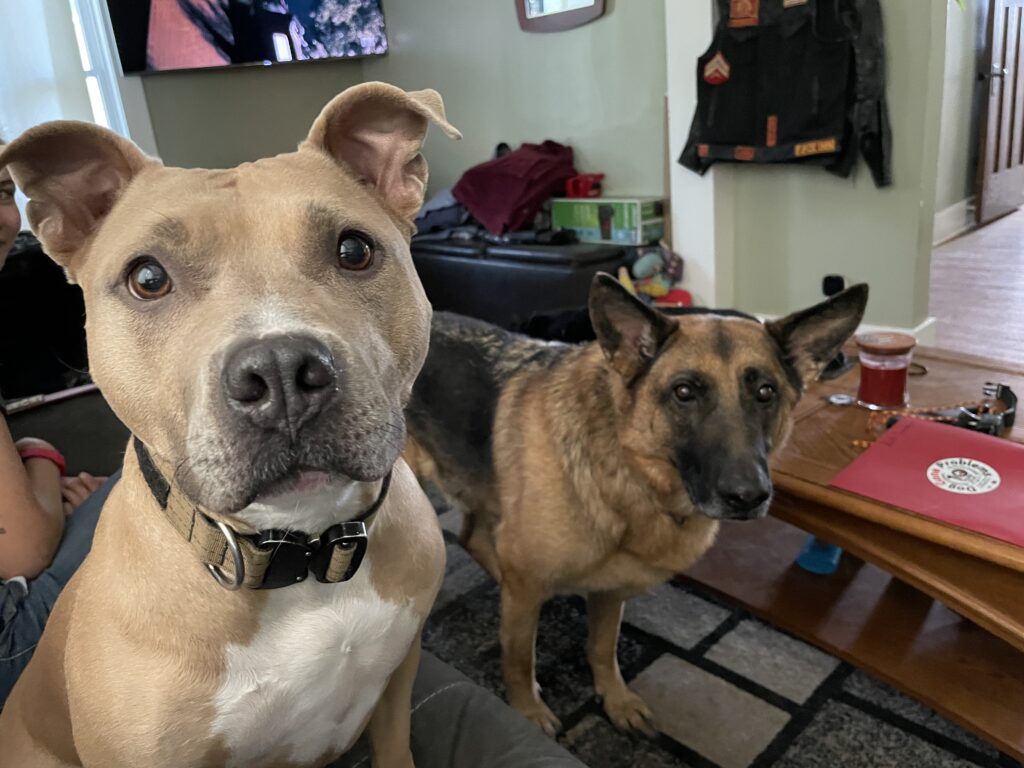Dog Behavior Advice Column – Tips for a Dog Who Barks for Pets
By: David Codr
Published Date: August 15, 2023
If your have a dog who barks for pets, you are going to love this Dog Behavior Advice Column. In this week’s column I share some tips to teach dog manners and how to deal with dogs who demand attention when they see thier room mate getting some pets they want.
I answer dog behavior advice questions like this each week; sharing the tips and secrets I teach our in home dog behavior clients. If you have a dog behavior or training question, you can email it to me (along with a pic of your dog) to dogbehaviorquestions@gmail.com.
Tips for a Dog Who Barks for Pets
Hi David,
We have two dogs and whenever we pet one of them, the other dog gets jealous and comes over looking for some pets for themself. If we don’t pet the second dog, we get pawed, nudged or barked at until we do, so now we just start petting them as soon as they come over.
We love our dogs and give them plenty of attention and affection, but you’d think we never pet the other one with how they act we one sees us petting the other.
Amy
Dear Amy,
While I never want to say people pet their dogs too much, I sometimes recommend they pet their dogs differently.
I often suggest something I call Petting with a Purpose. This means petting your dog after it does something (sit, come, lay down, etc) you ask it to do. Instead of petting one of your dogs just because you feel like it (which is fine) or petting a dog who barks for pets, try pet it for following a command you give (sit, down, etc). This helps develop a healthy leader follower dynamic between you and your dogs.
If your dog does what you ask, say your marker word, then pet your dog under its chin or on its chest. If your dog doesn’t do the cue (provided they know how) in a 2-3 seconds, go back to what you were doing before.
Not being rewarded for failures or is half of how dogs learn. Many people ask for a cue, then pet the dog if it does it or not. While its not exactly the same thing, try to think of petting your dogs as paying them. Would you get paid if your boss asked you to do something at work and you refused?
Now there is a difference between not petting and getting upset at your dog for not doing as you ask. Dogs dont need to be punished to learn. In fact, getting mad, yelling, spanking or just being resentful towards a dog can have a negative impact and damage your dog’s confidence and relatoionship (trust) with you. So dont do that. Punishment is not something that will help your dog, you will feel bad for doing it and it wont help!
Instead, if your dog doesnt to what you ask, turning your attention back to what you were doing can be a powerful motivator. Your dog will think, if I do what they ask, I get attention. If I don’t, I don’t get that attention. This is an easy way to motivate your dog while also teaching them good manners (sit = attention) and a a healthy leader follower dynamic. Its also a wonderful way to stop a dog who bark for pets.
Now to address your dog’s attention seeking behavior when they see the other dog getting some pets. If you are petting one dog and the other comes over and barks for attention, ask the second dog to do something (while you continue to pet the first dog) then pet the second dog if it complies. If the second dog doesn’t do as you ask, go back to petting your first dog exclusively.
If the second dog doesnt do as you ask and starts barking, nudging or pawing at you again, immediatly get up and go to a room where you can close the door so you and the first dog are alone. Spend a minte petting the first dog and wait for the other dog to stop barking before you return. I know this is an inconvenience, but if you get up and leave consistently the first time (first time is important) it barks, nudges or paws for attention, your dog will learn that those actions cause you to go away.
One of the most common mistakes dog guardians do in situations like this is verbally chastize the dog “no,” or “bad dog, stop that,” when the dog offers undesired behaviors. The reason this is a problem is ALL ATTENTION is rewarding for dogs. So telling your dog “no” is actually more likely to cause the dog to do the behavior again as it worked (it got your attention). Dogs dont see much of a difference between “good” attention and “bad” attention from you. They just think, “if I paw / bark / nudge my human, I get their attention.” Repeat that a bunch and you are literally training your dog to do the exact opposite of what you mean. This is how many people accidentally train a dog to bark for pets or attention.
Combined with Petting with a Purpose, your dogs should start to look at your petting as a reward from their favorite authority figure instead of something they can get on demand. This will build a positive behavior (sitting to ask for attention), make it easier for your dog to sit on cue, deepen your dog’s respect for you and help them think of listening to you as a great thing to do.
Good luck and remember; everything you do trains your dog. Only sometimes you mean it.
David
Submit your pet questions to Dog Behaviorist David Codr by emailing a photo of your dog and question to dogbehaviorquestions@gmail.com
Categorized in: Dog Behavior


